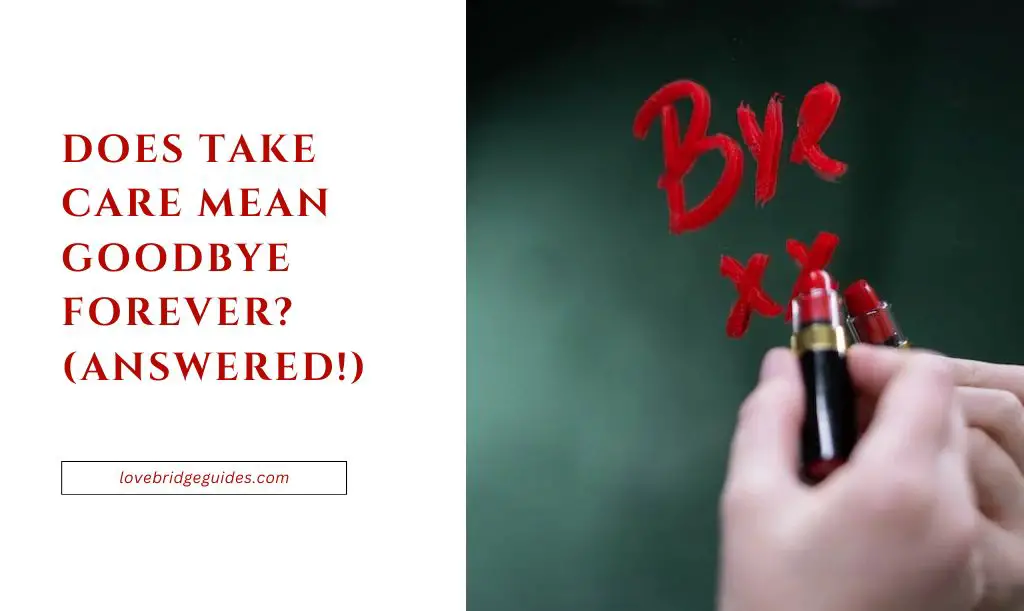Does take care mean goodbye forever?
To answer this, let us begin by examining the peculiar nature of “take care.”
On the surface, it appears to be a kind gesture, urging someone to prioritize their well-being and safety.
Yet, there is an air of detachment that lingers in its delivery.
It insinuates a temporary parting rather than an eternal goodbye.
It implies that our paths may cross again someday and that we should guard ourselves until then.
Now we arrive at the dreaded territory of “goodbye forever.”
These two words collide with such force that they send shockwaves through our souls.
They scream finality; they promise endings and severance.
When spoken with conviction, they signify an irrevocable separation – be it from a lover’s embrace or the warm bonds shared between friends.
Yet, we must remember that even amidst this sorrowful farewell lies closure and acceptance.
To bid adieu eternally requires strength – strength to let go and strength to move forward.
There is much more to unpack in this profound topic, but for now, let us dwell upon these initial reflections on the nature of “take care” as a farewell phrase and delve into the depths of what saying “goodbye forever” truly entails.
The Power of Words
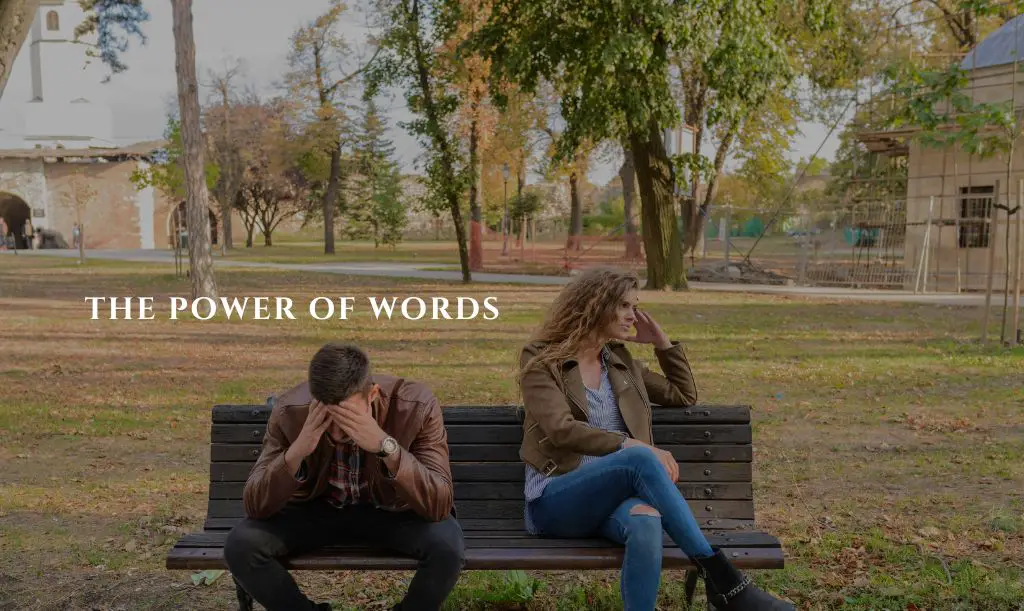
Words carry immense power.
They have the ability to shape our emotions, influence our actions, and define the nature of our relationships.
When we bid farewell to someone, the words we choose can leave a lasting impact on both parties involved.
It is not a mere exchange of niceties; it is an opportunity to convey our true feelings and intentions.
Whether it’s a simple “goodbye” or a heartfelt “take care,” each word holds the potential to either strengthen or sever the connection between individuals.
How Different Phrases Can Convey Varying Levels Of Finality
Within the realm of farewells, different phrases possess distinct levels of finality.
Saying “see you later” suggests that there will be another encounter in the future, maintaining hope for continued interaction.
On the other hand, uttering “farewell” carries a more profound sense of departure and signals an indefinite parting.
The phrase “take care,” although seemingly benign at first glance, conveys an underlying sense of concern and attachment that distinguishes it from a casual goodbye.
It implies an ongoing emotional investment in the other person’s well-being even when circumstances prevent physical closeness.
Words are not mere tools for communication; they hold immense weight in shaping human connections.
It is crucial that we choose them wisely when bidding adieu to someone dear to us, as they have far-reaching implications beyond just parting ways temporarily or permanently.
Unveiling the Layers of “Take Care”
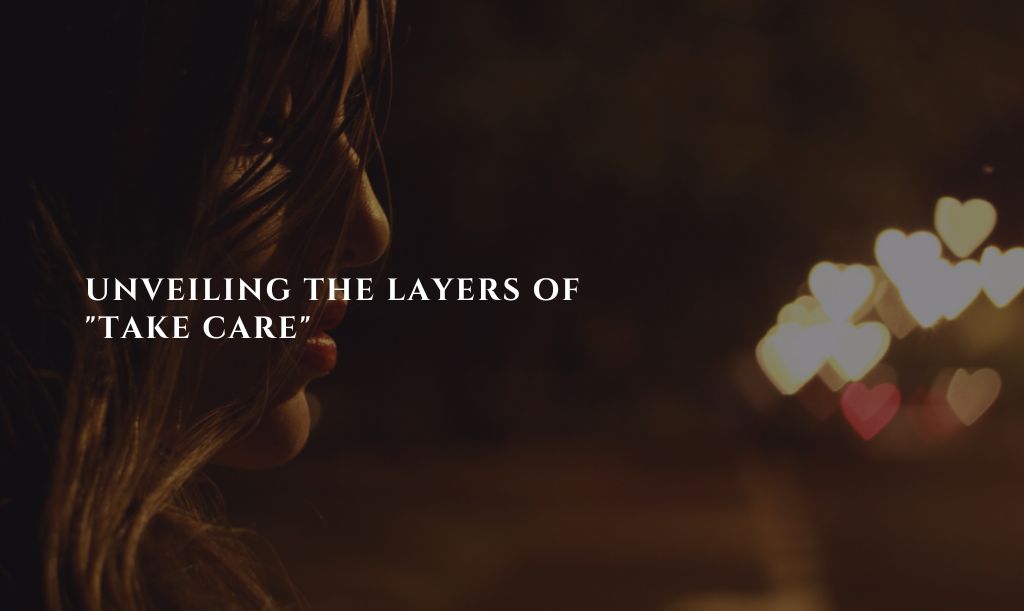
“Oh, take care!”
How often have we heard or used this seemingly innocuous phrase in our daily interactions?
It has become a default parting sentiment, a way to wrap up conversations with a dash of politeness.
At face value, “take care” appears to be nothing more than a well-wishing declaration.
It conveys the basic desire for the person’s safety and happiness, an expression of concern for their general well-being.
In casual conversations or when parting ways temporarily, we rely on this phrase as a social convention to demonstrate that we acknowledge and value the other person’s presence in our lives.
Beneath The Surface: Hints At A Deeper Connection And Attachment
However, let us delve beneath this facade of conventional politeness and explore the hidden layers of meaning within “take care.”
Could it be possible that this simple phrase carries more weight than meets the eye?
Look carefully, and you will find that it hints at something deeper—a desire to maintain a bond beyond physical separation or challenging circumstances.
It reflects an unspoken emotional investment in the relationship with another person.
Though not explicitly stated, “take care” suggests an ongoing attachment that transcends mere pleasantries.
It reveals our hope for their safety beyond immediate encounters—a longing for their continued happiness even when life pulls us apart.
In an era where human connections can often feel transient, “take care” serves as a subtle reminder that our relationships have significance beyond surface-level interactions.
It signifies a genuine concern for each other’s journey through life—a recognition that we are not merely passing ships but individuals who impact each other in profound ways.
So next time someone bids you farewell with these seemingly ordinary words, pause to consider the possibility that they may be expressing more than just a fleeting sentiment.
The Subtle Nuances of “Goodbye Forever”
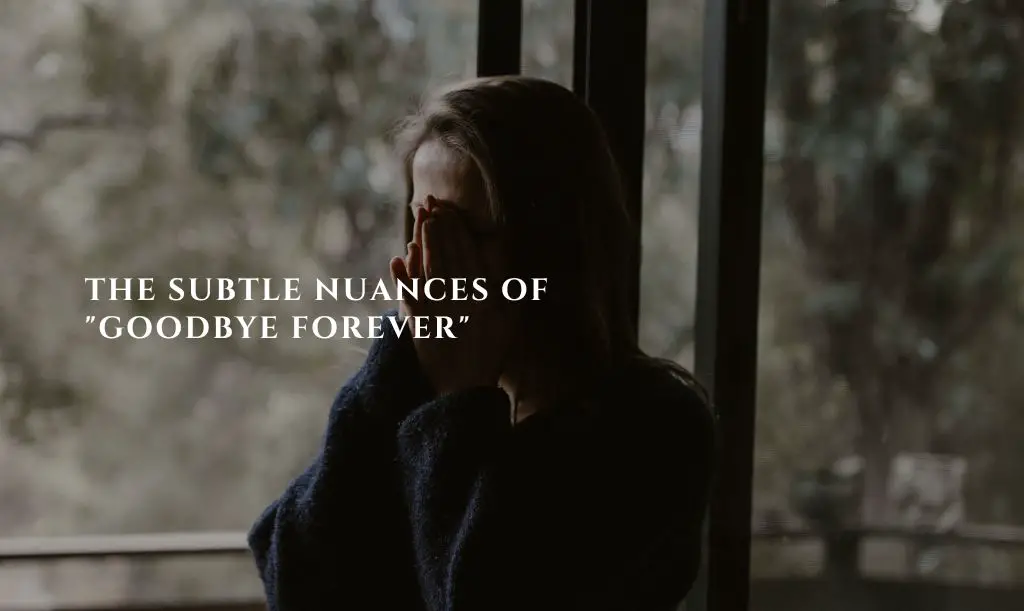
There is a lot of weight that rests upon those two simple words: “goodbye forever.”
Their very utterance holds within it an irrevocable finality that can shatter hearts and leave a permanent scar on the soul.
It is a phrase that signifies the end of a relationship, a connection severed, and a bond broken beyond repair.
The gravity of those words cannot be underestimated, for once spoken, they carry with them the heavy burden of closure.
When one bids farewell with the phrase “goodbye forever,” there is no room for doubt or ambiguity.
It is an unequivocal declaration that there will be no reunion, no reconciliation, and no chance to mend what has been irreparably shattered.
It signifies an acceptance of the truth that this chapter in our lives has reached its bitter end.
Like closing a book whose pages have been filled with joy and sorrow alike, “goodbye forever” encapsulates an eternal goodbye.
Implies Closure, Acceptance, and Moving On from Each Other’s Lives
To say “goodbye forever” is not merely to bid adieu; it implies so much more.
It speaks of closure—a necessary step towards healing and growth in our own separate paths.
In accepting this final farewell, we acknowledge that we must move forward without one another’s presence to lean upon or seek solace in.
There is a bittersweet beauty in the acceptance of this reality—knowing that while we may cherish memories shared in the past, we must now forge ahead on our individual journeys.
Context Matters: Different Scenarios where “Goodbye Forever” Might Be Used
These two words find their way into conversations plagued by emotional turmoil and broken dreams.
In romantic relationships that have reached an irreparable state, “goodbye forever” carries the sorrow of lost love, shattered promises, and the realization that the once vibrant flame has extinguished into cold ashes.
It is also whispered amongst friends who have grown apart or experienced significant conflicts—where time and circumstance have eroded the bridges that once connected their lives.
In these contexts, “goodbye forever” serves as a painful acknowledgment of irreconcilable differences and a farewell to what once was.
The Intersection between “Take Care” and “Goodbye Forever”
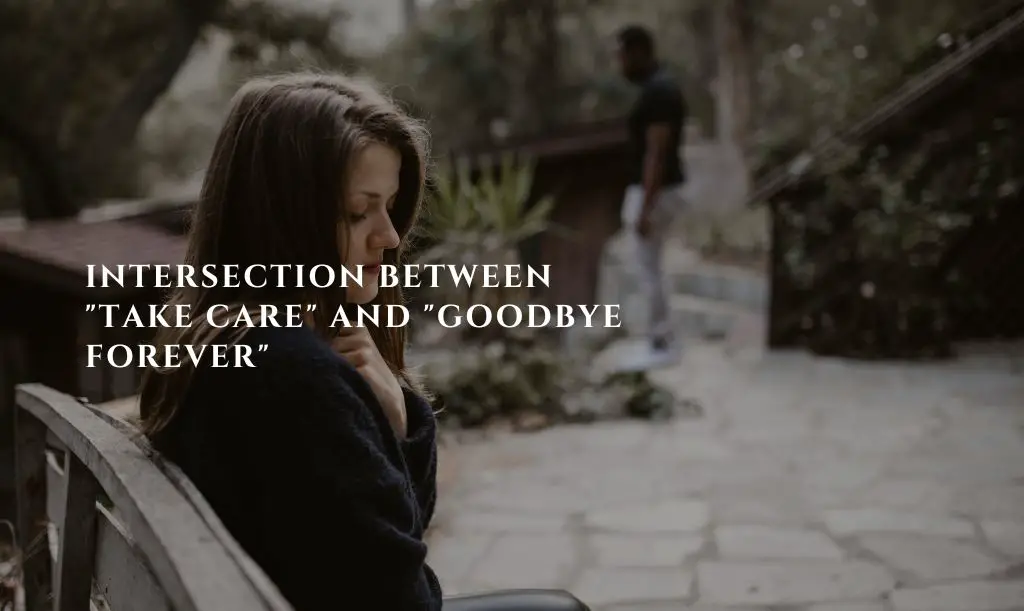
In the complex realm of human emotions, it is not uncommon for seemingly contradictory phrases to coexist in certain contexts.
This is particularly evident when it comes to the intersection of “take care” and “goodbye forever.”
While “take care” implies a desire for nurturing and maintaining a connection, “goodbye forever” signifies an irrevocable separation.
The juxtaposition of these expressions highlights the intricate nature of human relationships, where individuals may experience conflicting emotions simultaneously.
One notable scenario where both “take care” and “goodbye forever” are used together is in the aftermath of a romantic breakup.
When partners part ways, they may still harbor genuine concern for each other’s well-being, wishing nothing but happiness and fulfillment.
Thus, they utter the phrase “take care.” However, alongside this expression of kindness lies the acknowledgement that their paths will never converge again—”goodbye forever.”
This combination reflects the bittersweet reality that despite caring for each other deeply, they have accepted that their relationship has come to an end.
The simultaneous use of “take care” and “goodbye forever” underscores the complexity of human emotions and relationships.
It serves as a reminder that our feelings are rarely black or white but rather a swirl of shades in between.
By acknowledging this duality within farewell phrases, we gain insight into the intricacies underlying our connections with others.
Does Take Care Mean Goodbye Forever? Conclusion
So, does take care mean goodbye forever?
Well, in navigating human interactions laden with farewells and goodbyes, it is crucial to recognize that words hold immense power.
The phrases we choose can convey varying levels of finality and emotional depth.
The intersection between “take care” and “goodbye forever” showcases the complexity of human emotions, where expressions that seemingly contradict each other can coexist within certain contexts.
Although it may seem paradoxical, this juxtaposition offers a reminder that even in parting ways, care and concern can persist.
It is a testament to the resilience of human connections, as we strive to maintain emotional bonds despite the temporary or permanent nature of our goodbyes.
So, let us bid adieu with grace and empathy, knowing that in embracing the shades of complexity within our farewells, we pave the way for new beginnings and continued growth.
Related Articles:
- https://lovebridgeguides.com/what-does-it-mean-when-someone-replays-your-snap/
- https://lovebridgeguides.com/when-a-guy-picks-you-up-off-the-ground/
- Does A Prom Date Mean Anything? (Answered!) - 20 February 2024
- Boyfriend Refers To Me In Third Person (Explained!) - 20 February 2024
- Is Sending Memes Flirting? Find Out Here! - 20 February 2024

